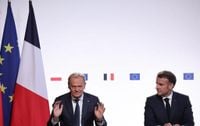On Friday, May 9, 2025, France and Poland took a significant step in bolstering their defense cooperation by signing a treaty in Nancy, aimed at mutual assistance in the event of an attack. This agreement comes in the wake of heightened tensions in Europe, particularly following Russia's invasion of Ukraine in 2022. French President Emmanuel Macron and Polish Prime Minister Donald Tusk, both staunch supporters of Ukraine, were present for the signing, which emphasizes their commitment to each other's security.
During the ceremony, Macron condemned Russian President Vladimir Putin's recent remarks at a military parade in Moscow, which commemorated the 80th anniversary of the defeat of Nazi Germany in World War II. Macron stated, "President Putin is on the side of war, not the side of peace," highlighting the stark realities of the ongoing conflict.
The treaty includes a crucial clause on "mutual defense," which complements existing protections provided by NATO and the European Union. Macron clarified, "It does not substitute for NATO or EU," but rather reinforces the existing framework of security cooperation. He expressed confidence in the rapid mobilization of troops should aggression arise, stating, "I have no doubt that yes, such a deployment would be possible in the face of aggression and if the worst were to happen."
Tusk hailed the treaty as a "historic event," emphasizing the depth of cooperation between the two nations. He expressed his belief that France and Poland would be able to rely on each other in all circumstances, saying, "I am profoundly convinced... that France and Poland will be able to count on each other in all circumstances, good and bad." The treaty explicitly states that in the event of armed aggression, both parties shall provide mutual assistance, including military means.
This commitment to defense is particularly significant for Poland, which shares a border with Russia's Kaliningrad exclave and has voiced concerns about potential Russian aggression. The treaty reflects a growing recognition of the need for European nations to bolster their military capabilities in light of recent geopolitical developments.
Meanwhile, Macron, who leads the EU's only nuclear weapons power, hinted that France's nuclear arsenal could be part of the assistance provided under the treaty. He noted, "The interests of our main partners are integrated in deciding what our vital interests are," underscoring the strategic importance of the agreement.
The signing of the treaty coincided with a broader context of international tensions, as the United States and its European allies proposed an unconditional 30-day ceasefire between Russia and Ukraine. Macron's comments painted a grim picture of Putin's intentions, asserting that the Russian leader is not interested in peace.
As the treaty was signed, Tusk and Macron also criticized the presence of over 20 international leaders at the Victory Day parade in Moscow. Tusk described their attendance as "a disgrace," particularly in light of Putin's rhetoric regarding Ukraine. He emphasized that the situation is clear-cut, stating, "the truth is black and white, and there can be no alternative interpretations or speculative narratives."
Among those attending the parade were Slovak Prime Minister Robert Fico and Serbian President Aleksandar Vučić, both of whom faced criticism for their participation. Tusk remarked that applauding Putin, who has made claims of purging Nazism from Ukraine, is shameful. He stressed, "Therefore, the presence at the Victory Day parade in a country that bombs cities, hospitals and kindergartens, and that has caused over a million people to be killed or wounded over the last three years, is a disgrace."
Fico's attendance at the parade was particularly controversial, as he arrived in Moscow after the Baltic states barred his aircraft from entering their airspace. This incident highlights the ongoing divisions within Europe regarding how to approach relations with Russia.
The signing of the treaty and the criticism of the Victory Day parade attendees are indicative of the shifting geopolitical landscape in Europe. With NATO member Poland aiming to expand its military capabilities — targeting an increase from 216,000 troops in 2024 to 300,000 by 2035 — the collaboration with France marks a pivotal moment in European defense strategy.
As Poland prepares for its presidential elections on May 18, 2025, the implications of this treaty could resonate deeply within the political arena. The elections are expected to be influenced by concerns over a potential Russian disinformation campaign, with the nationalist candidate backed by the Law and Justice (PiS) party set to challenge the pro-European mayor of Warsaw, who has the support of Tusk.
The treaty signed in Nancy not only solidifies the defense partnership between France and Poland but also sends a clear message to Russia and other nations regarding the commitment of European countries to mutual assistance and security. As tensions continue to rise, the implications of such alliances will be closely monitored by both allies and adversaries alike.




